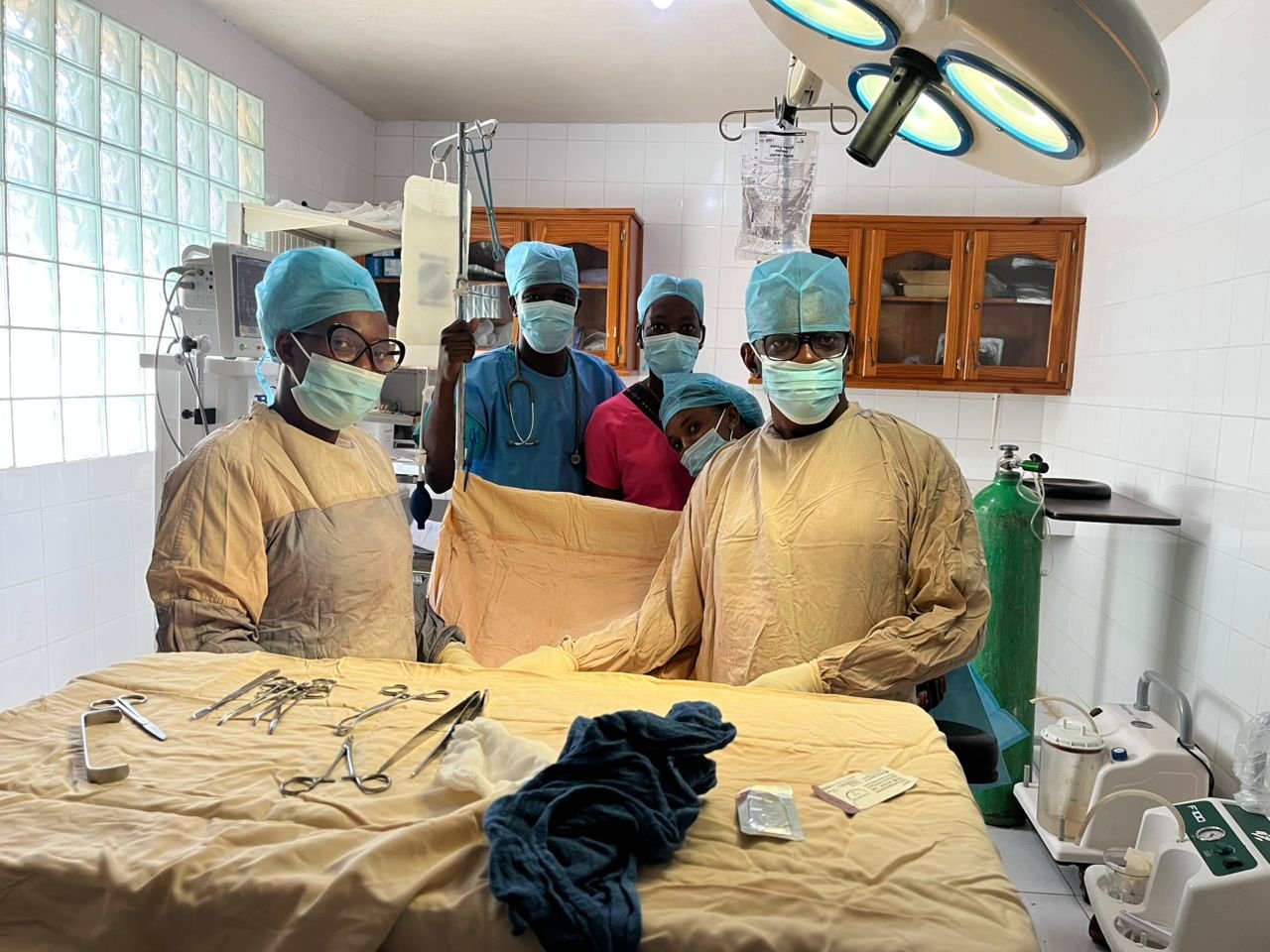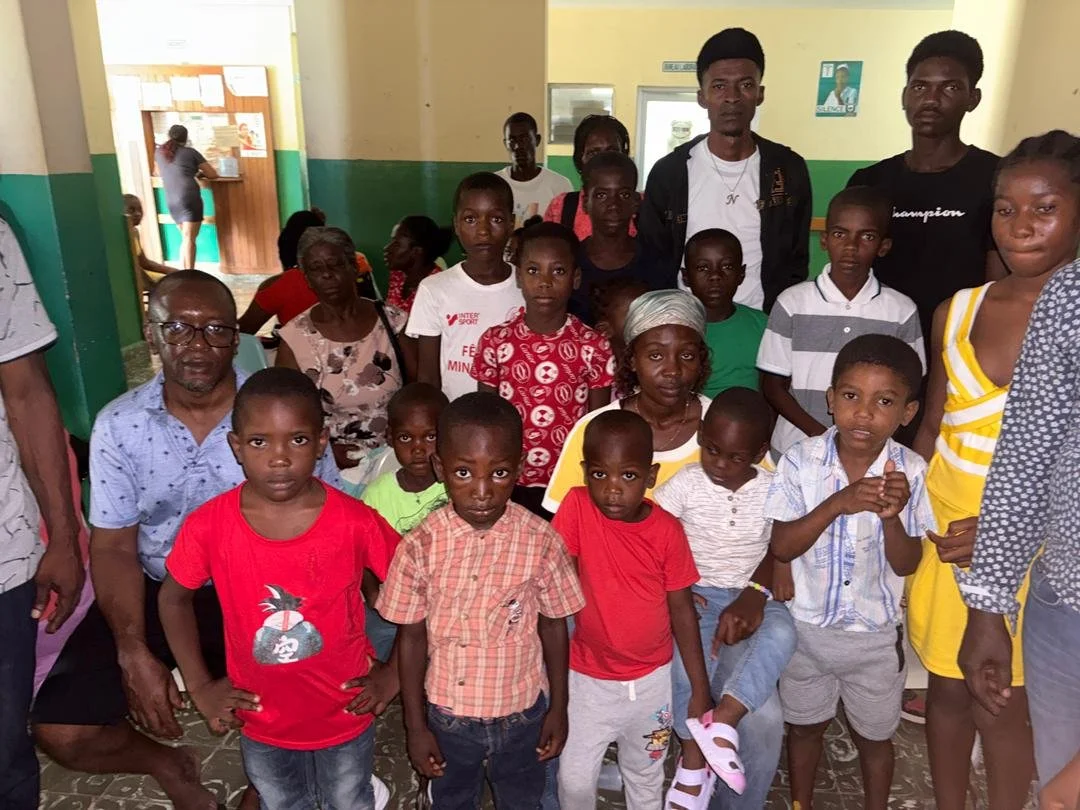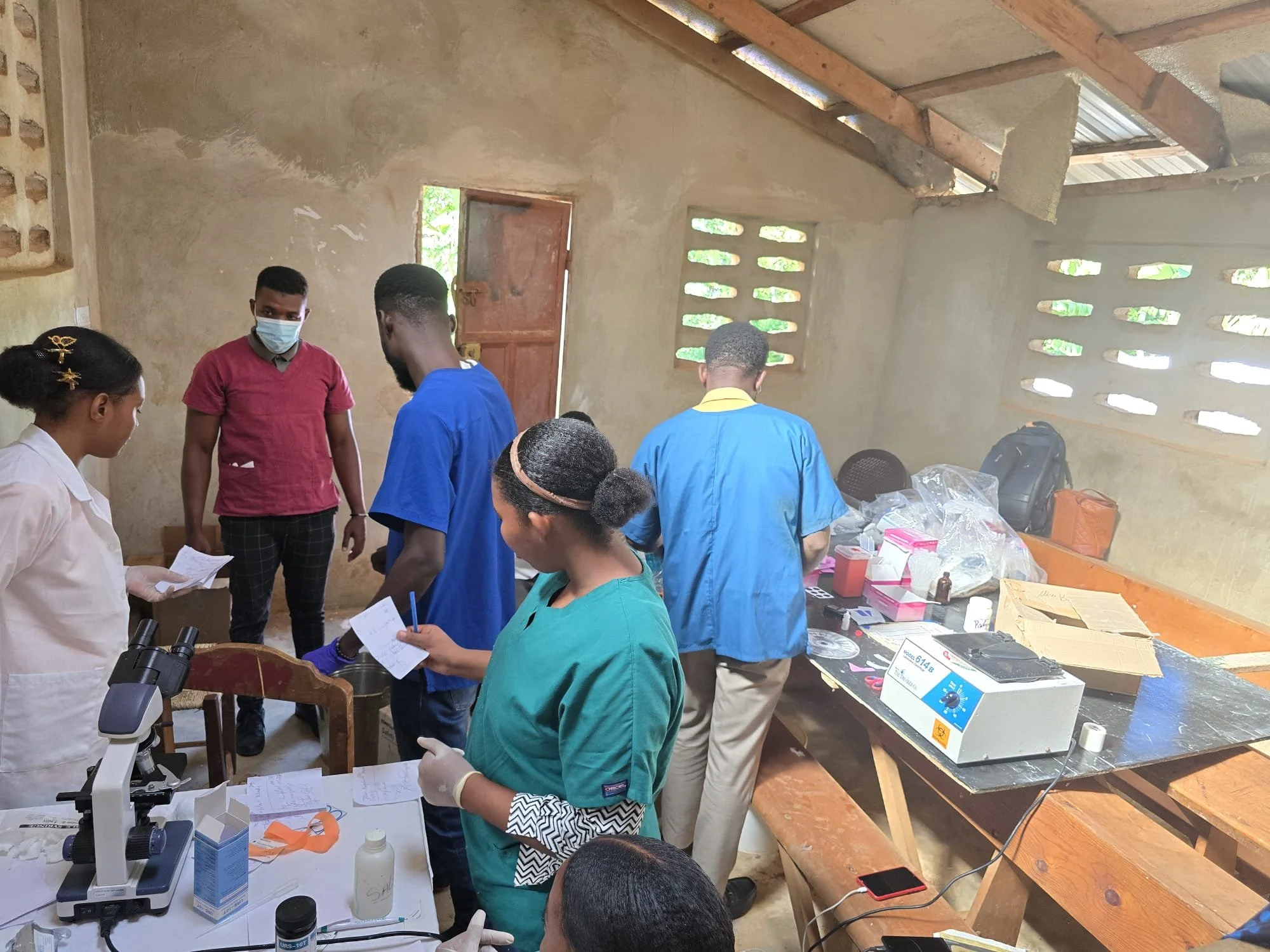Dr. Jacques and the surgical team
Healing Art Missions (HAM) is a nonprofit organization that has served rural Haiti for more than 26 years, helping communities access essential needs such as healthcare, education, clean water, and employment.
After the 2021 earthquake, HAM remained active in the Grand Sud region—not only for emergency relief, but as a long-term health partner. The Lancet Commission on Global Surgery (2015) emphasized that surgical care is a vital component of universal health coverage. With nearly five billion people worldwide lacking access to safe, timely, and affordable surgery, the Commission urged governments to treat surgery as essential—not optional.
In Haiti, this call is more urgent than ever. Between 2024 and 2025, Haiti’s health system collapsed. Armed attacks forced the closure of the country’s two largest hospitals—Hôpital de l’Université d’État d’Haïti (HUEH) and Hôpital Universitaire de Mirebalais. The main seaport shut down, halting medical supply imports. Armed groups blocked the Martissant road, cutting off southern Haiti from the capital, and even Toussaint Louverture International Airport faced repeated disruptions. Local hospitals were left without surgeons, staff, or medicine.
Haiti is now experiencing one of the most severe humanitarian crises in its history. Armed violence, political instability, and economic collapse have displaced more than 1.3 million people as of mid-2025. The Grand Sud region—comprising Sud, Nippes, and Grand'Anse—hosts more than 350,000 internally displaced persons (IDPs), many fleeing Port-au-Prince, where an estimated 85% of the city is under gang control. This mass migration has placed immense pressure on the region’s fragile health infrastructure.
Nearly 40% of health facilities nationwide are closed, and another 33% operate only partially. Over 40,000 health professionals have fled the country, leaving rural hospitals critically understaffed. Once considered the safest part of Haiti, the Grand Sud now faces growing malnutrition, disease outbreaks, and severe shortages of essential medicines and personnel.
Dr. Jacques’s Leadership and Mission Overview
While pursuing public health studies in Montreal, Dr. Jacques continues to lead HAM’s programs from afar—coordinating care, mentoring staff, and guiding operations remotely. His absence on the ground is deeply felt by both patients and hospital teams, underscoring his vital role.
In August 2025, he organized a 28-day mission, which included a six-day journey through Providenciales and Cap-Haïtien to reach Les Cayes. Once in the south, he led a focused team alongside HAM’s local staff, supported by secure medicine storage and reliable supply delivery. Together, they provided surgeries, mobile clinics, and strengthened partnerships with institutions such as Sainte-Thérèse Hospital, the Community Referral Hospital of Port-Salut, and Fondation Moun Lakay.
Reflecting on the experience, Dr. Jacques shared:
“I felt heartbroken when I saw more patients coming for surgery on my last day—August 28—at Port-Salut Hospital than on the first day I arrived, August 4. Major surgeries at Sainte-Thérèse couldn’t be done, and hospitals like Hôpital Conception in Les Cayes were asking for my support—but it just wasn’t possible in such a short period.”
Dr. Jacques with patients at Hôpital Communautaire de Référence de Port-Salut
Despite these challenges, the mission exceeded expectations. Ninety-nine surgeries were performed in Port-Salut alone, surpassing the combined surgical output of both partner hospitals during Dr. Jacques’s absence. This number represents nearly one-quarter of HAM’s total annual surgical volume in the southern region over the past two years. Surgical consultations during the mission accounted for roughly one-third of HAM’s total consultations in that same period—and included the first pediatric surgeries (under age 8) at Port-Salut Hospital since Dr. Jacques’s departure from Haiti.
With few exceptions—such as Médecins Sans Frontières, Mirebalais, Albert Schweitzer, St. Boniface, and the General Hospital in Port-au-Prince—most hospitals in Haiti struggle to reach even 500 general surgeries per year. HAM’s adaptability, leadership, and enduring presence make it uniquely effective in reaching Haiti’s most vulnerable communities.
Surgical Missions Across Partner Hospitals
HAM conducted a comprehensive surgical mission in southern Haiti, working at two key hospitals:
Hôpital Communautaire de Référence de Port-Salut
Hôpital Sainte-Thérèse de Miragoâne
Over the course of the mission, the team performed 108 surgical procedures and conducted 204 consultations.
Surgical cases included:
Hernia repairs (including recurrent and strangulated cases)
Hydrocele surgeries and cryptorchidism corrections
Anal surgeries for hemorrhoids and fistulas
Congenital and soft-tissue mass removals
Hysterectomies and biopsies for suspected cancer
Emergency cesarean sections
In total, 13 biopsies and 10 Pap tests were completed.
All general surgeries were performed by Dr. Jacques, ensuring consistent quality and surgical leadership throughout. Orthopedic cases in Miragoâne were managed by local staff, while Cuban OBGYNs in Port-Salut carried out cesarean sections and hysterectomies, allowing maternal care to continue uninterrupted. HAM’s presence was fully integrated into local hospital workflows, ensuring both elective and emergency procedures proceeded without disruption.
Safe Medicine Program
A key factor in the mission’s success was HAM’s Safe Medicine Program, which pre-positioned essential medical supplies at both hospitals. Despite nationwide shortages, HAM ensured the availability of anesthesia drugs, surgical sutures, hernia mesh, antibiotics, sterile trays, and pain medications.
This readiness not only kept operating rooms functional but also allowed HAM to respond to emergencies beyond its immediate sites. When St. Boniface Hospital in the south urgently requested anesthesia drugs, HAM delivered two 100 ml vials of isoflurane within hours—a lifesaving resource the hospital director thought impossible to find.
No major complications occurred during the mission. One high-risk patient developed a postoperative infection due to missed medication but recovered fully thanks to prompt intervention.
Nurse Durone Nadège and Midwife Joel Saint-Cyr with a patient
Mobile Clinic in Nan Plain
HAM partnered with Fondation Moun Lakay to bring a mobile clinic to Nan Plain, a remote area between Miragoâne and Petit-Goâve. Over two days, the team treated 500 patients for maternal health, chronic illness, and child wellness. They also conducted 53 Pap tests, performed on-site lab testing, and distributed medications. The clinic brought essential care to families who would otherwise walk hours for basic health services.
Strengthening Local Partnerships
During his mission, Dr. Jacques met with partners and community leaders across the southern region to reinforce collaboration and assess future priorities.
He worked with HAM’s Water and Vaccination Program Coordinator in Démier to review progress on clean water and vaccination access. In Jacmel, he reconnected with Dr. Shilly Saint Louis, a former orthopedic collaborator now leading the Safe Medicine Project there. In Les Cayes, he met Dr. Cliford Gauthier, coordinator of the Safe Medicine Program in the Grand Sud.
Dr. Jacques also met with two of his former students, Dr. Michel and Dr. Bien-Aimé, who lead a mobile clinic serving isolated rural communities near Port-Salut. This team now operates four clinics each month, delivering primary care to populations with limited access to formal facilities.
Visits to Baradères and Nan Plain revealed extreme isolation and urgent need. In Baradères, a new clinic under construction in Rivière Salée will eventually serve residents who must currently travel for hours—or be carried—to reach medical care. In Nan Plain, families walk up to four hours to reach Petit-Goâve or Miragoâne for basic services.
These encounters reaffirmed HAM’s credibility as a senior, trusted organization—valued by both local and international actors for its reliability, collaboration, and sustained presence.
Patient Stories: The Human Side of the Mission
Every case carries a story:
Pierre, age 6
“I don’t want to go to school anymore. The other kids laugh at me because of my big belly.”
Pierre suffers from a large bilateral inguinal hernia. His condition caused social exclusion and emotional distress, keeping him out of school.
Joseph, age 30
“My wife left me. People talked behind our backs. I tried to hide it, but the swelling kept growing.”
Joseph’s untreated hydrocele led to the breakdown of his marriage and deep psychological suffering.
Johane, age 63
“I was ready to sell my two sheep to pay for surgery. The pain is unbearable—I can’t work anymore.”
Johane’s painful inguinal hernia threatened her health and her family’s livelihood.
Philippe, age 21
“I left Port-au-Prince by boat. I traveled three hours across the sea for this chance.”
Philippe’s journey shows the desperation and determination of those seeking surgery in underserved areas.
Emergency Cesarean – Port-Salut
“It was almost midnight. They said the baby was suffering. The doctors came and revived my baby. They saved both of us.”
A young mother survived obstructed labor thanks to HAM’s on-site surgical team.
Strangulated Hernia – Fisherman from Port-Salut
“If you hadn’t been here, I would’ve had to travel two hours to Les Cayes. I don’t know if I would’ve made it.”
A late-night emergency surgery saved this fisherman’s life.
Strategic Collaborations and Ministry Support
The mission succeeded thanks to collaboration with key partners:
Hôpital Sainte-Thérèse de Miragoâne
Port-Salut Community Hospital
Fondation Moun Lakay (co-support for mobile clinics)
Dr. Gauthier Cliford, Les Cayes
Dr. Bertrand Sinal, Minister of Health
HAM staff in Haiti: Lavalasse Pierre Wilmane, Durone Nadège, Jean Clausel, Frody Cheriza, Joel Saint-Cyr, and Dr. Denis
HAM board and supporters worldwide
The Ministry of Health played a critical role by authorizing the purchase and import of essential anesthesia drugs, antibiotics, and surgical materials, ensuring legal and safe delivery to partner hospitals.
Public Health Integration
HAM’s work goes beyond surgery. Our public health initiatives in vaccination and clean water continue through dedicated local agents like Ferdinand in Démier, who maintains vaccine distribution and sanitation programs.
Despite reduced international funding, essential medicines—including vaccines and antiretrovirals—remain available in partner hospitals, a testament to the Ministry’s resilience and HAM’s strong local networks.
HAM medical team processing labs at rural clinic
Conclusion
The August 2025 mission demonstrates the power of collaboration, local leadership, and international solidarity. Through strategic partnerships, regulatory support, and community engagement, Healing Art Missions continues to deliver high-quality surgical and public health services to Haiti’s most underserved regions.
HAM’s impact is not measured only in surgeries performed, but in lives saved, systems strengthened, and trust restored. The mission reflects the vision of the Lancet Commission on Global Surgery—that safe, timely, and affordable surgical care is a cornerstone of universal health coverage.
As Haiti faces its greatest test, HAM remains steadfast: building resilient systems, empowering communities, and renewing hope—one mission at a time.




